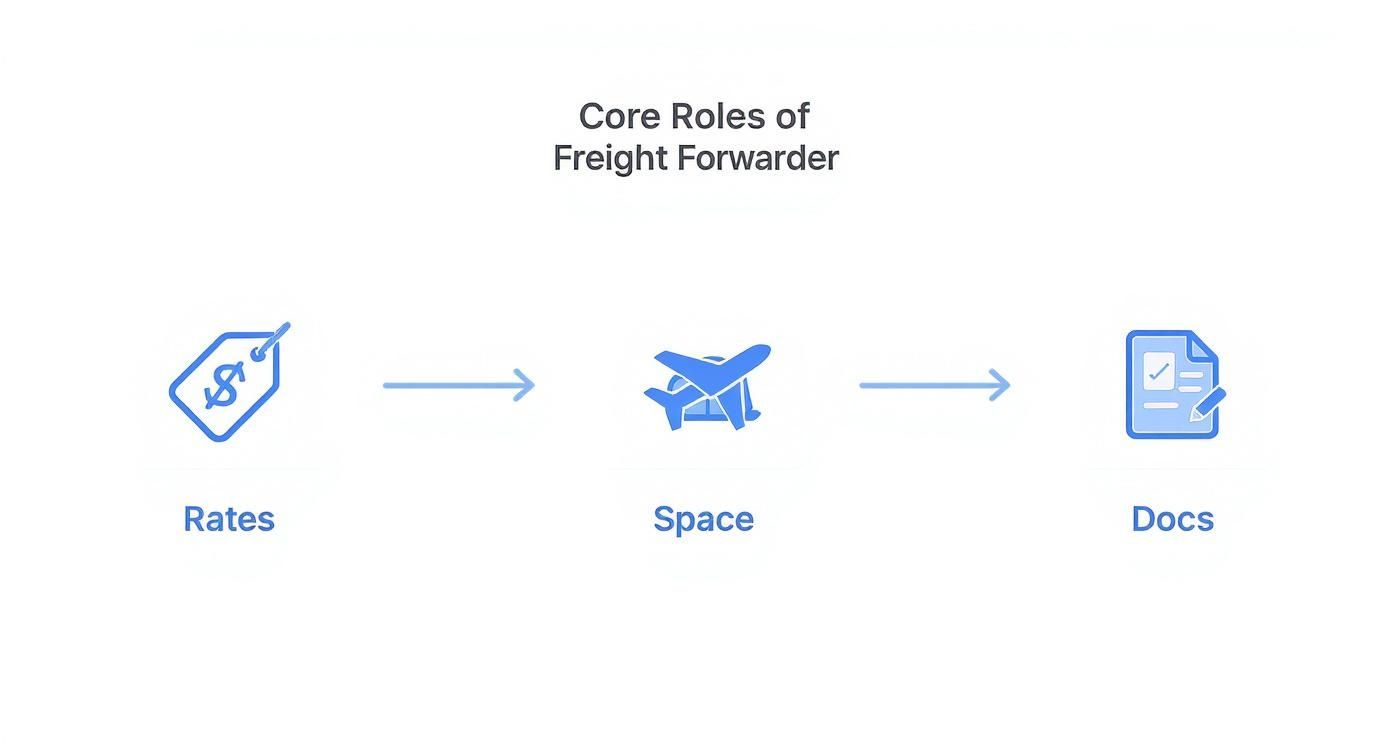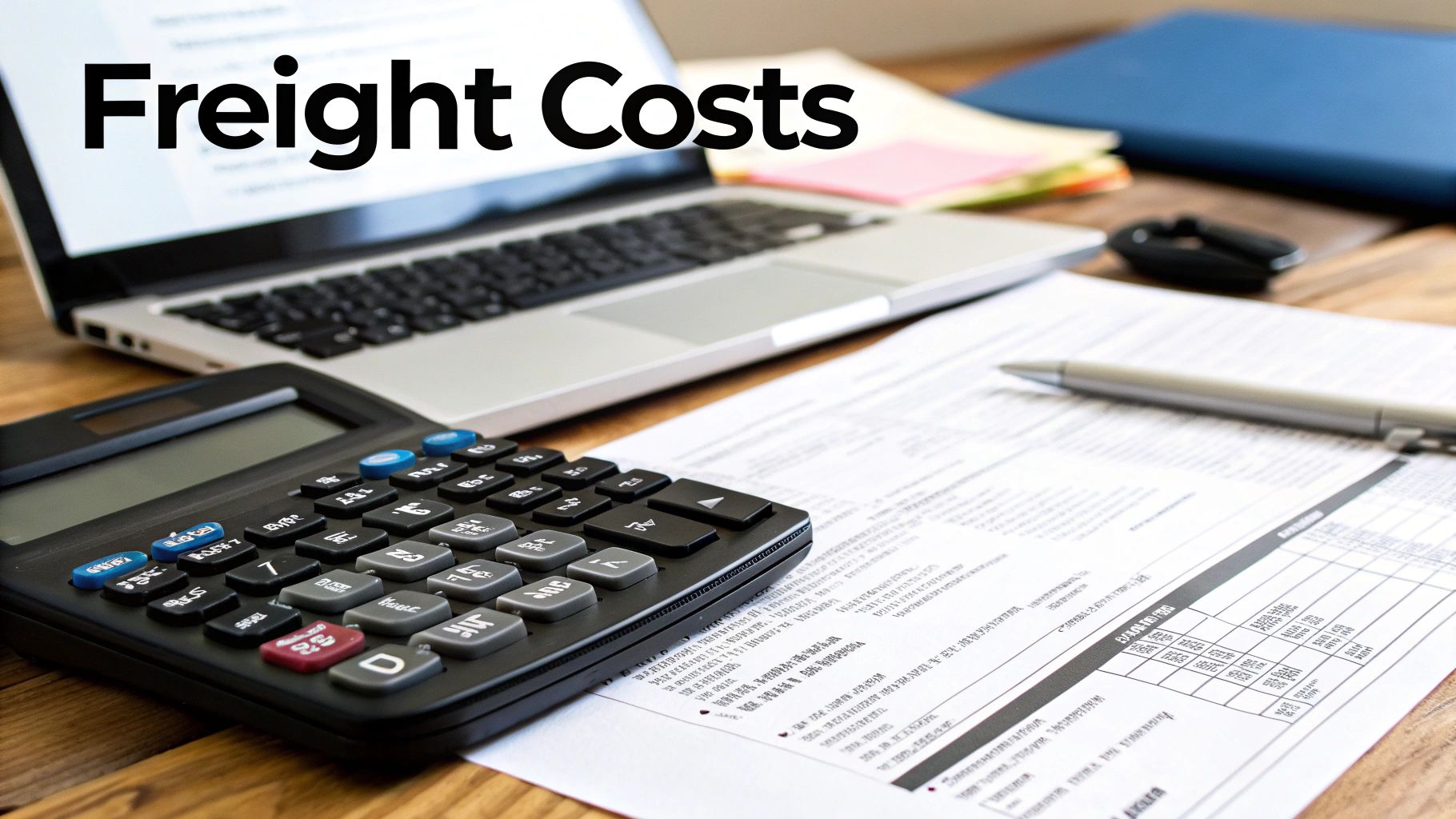Think of an air freight forwarder as the master planner for your international shipments. They're not the ones flying the planes, but they're the experts who orchestrate the entire journey for your cargo, from the factory floor to the final destination.
The Role of an Air Freight Forwarder Explained
So, what does a forwarder actually do? Imagine you're putting on a major concert. You wouldn't be expected to own the stadium, play the instruments, or handle security yourself. You'd hire a promoter to bring all the pieces together. That's exactly what an air freight forwarder does for your goods.
They coordinate with the airlines, arrange ground transport, deal with customs officials, and manage warehousing. They are your single point of contact, taking a complex logistical puzzle and turning it into a smooth, managed process. A solid grasp of What is Air Freight is a great starting point to see just how vital their role is, especially when you need to move goods quickly across borders.
Core Functions of Your Logistics Partner
A good forwarder’s real value is in the details—the kind of details that make the difference between a shipment arriving on time or getting stuck for weeks. Instead of you trying to juggle multiple contacts in different countries and time zones, they manage everything. This is especially true in busy, high-volume markets.
Take China, for instance. Domestic air freight recently hit around 0.452 million tons in a single month, a massive jump that shows just how competitive space can be. In a market like that, having an expert forwarder with established relationships is non-negotiable for securing a spot on a plane.
A great freight forwarder does more than move boxes; they provide strategic value by optimising routes, managing risks, and ensuring your supply chain remains resilient and cost-effective.
Why You Need an Expert on Your Side
At the end of the day, working with a forwarder is about saving your business time, money, and a lot of headaches. They have the industry connections and shipping volume to get much better rates from airlines than a single company ever could. You can learn more about how we handle the complexities of air freight and provide total visibility from start to finish in our detailed guide.
Their essential tasks include:
- Negotiating Rates: Finding and securing the best possible pricing from air carriers.
- Booking Cargo Space: Making sure your goods get a confirmed spot on the right flight.
- Preparing Documentation: Handling all the critical paperwork, like the Air Waybill (AWB) and customs declarations.
- End-to-End Coordination: Managing the entire process, from pickup at the origin to the final delivery.
Tracing Your Shipment's Journey Step by Step
Ever wondered what actually happens to your cargo after you hand it off? It might seem like a black box, but a good freight forwarder air freight service breaks down the journey into a series of well-coordinated steps. Think of them as the director of a complex play, ensuring every actor—from the pickup driver to the customs agent—hits their cues perfectly.
It all kicks off the moment you book your shipment. Your forwarder dives into the details of your cargo—what it is, how big it is, and how much it weighs—to find the right airline and the smartest route. Once you give the green light, the physical journey begins.
From Your Door to the Airport
The first leg of the journey is what we call origin handling. This is everything that happens on the ground to get your goods prepped and ready for their flight.
- Cargo Pickup: A truck, arranged by your forwarder, shows up at your warehouse or factory to collect the shipment. Simple as that.
- Warehousing and Consolidation: Your goods are then taken to a secure warehouse. If you're shipping a smaller load, this is often where the magic happens—it gets consolidated with other shipments. This is a clever way freight forwarders save you money by optimising space on the plane.
- Export Customs Clearance: Before anything can leave China, it needs the official stamp of approval. Your forwarder acts on your behalf, preparing and submitting all the necessary paperwork to make sure your export is fully compliant with local laws. No headaches for you.
Once customs gives the all-clear, your shipment is handed over to the airline's ground crew at the airport. They'll do one last check before loading it safely onto the aircraft.
This is where a forwarder really shows their value, juggling rates, booking space, and handling all the documents.

As you can see, the forwarder becomes your single point of contact, taking three complex tasks and making them feel like one simple transaction.
Arrival and Final Delivery
When the plane touches down at the destination, the whole process mirrors itself, but this time with a focus on import rules. The cargo is carefully unloaded and moved to a bonded warehouse, where it waits for customs clearance.
This is where your freight forwarder’s destination partner or agent steps in. They're the local expert, navigating the complexities of local customs to get your shipment cleared for entry. Having someone who knows the system inside and out at this stage is crucial—it can be the difference between a smooth arrival and a shipment stuck in limbo.
The final mile is often the most complex part of the journey. A skilled freight forwarder ensures that the handover from international air transit to local ground delivery is completely seamless, preventing delays at the destination airport.
After all duties and taxes are settled and your cargo is officially released, the last step is put into motion: the final-mile delivery. Your forwarder arranges for a local truck to pick up your goods from the airport and deliver them right to your doorstep. All the while, you're kept in the loop with tracking and updates, so you have full visibility from start to finish.
A Look at Major Air Freight Routes from China
When you're shipping by air, not all paths are the same. This is especially true when your goods are coming out of China. The main air corridors—one heading to North America, the other to Europe—are like two completely different highways, each with its own traffic patterns, peak times, and toll costs.
For any business using a freight forwarder air freight service, knowing the ins and outs of these routes is the key to getting your shipments delivered on time and on budget. A good forwarder does more than just find a spot on a plane; they live and breathe this stuff. They understand that flying into a major European hub like Frankfurt presents a totally different set of challenges than flying into Los Angeles. This kind of hands-on knowledge is what makes a supply chain truly efficient.
The China to Europe Corridor
The air link between China and Europe is a massive pipeline for global trade, often acting as a bellwether for the region's economic health. It's also quite sensitive to market shifts. A slight dip in consumer spending in Europe can ripple back and create excess capacity on this route almost overnight.
For example, recent data from WorldACD highlighted a period where air cargo tonnage from China to Europe dropped week after week. The year-on-year volume was down anywhere from 3% to 10%. This points to a cooling of demand, which directly affects both pricing and how easy it is to secure a booking.
An experienced freight forwarder sees these trends not as problems, but as information. A drop in volume could mean a chance to negotiate better rates for a client. On the flip side, a sudden spike tells them to lock in space now before it disappears.
The China to North America Route
Things often look quite different on the trans-Pacific route to North America. This corridor is heavily influenced by the constant hum of e-commerce and distinct consumer buying patterns. Demand here tends to be a bit steadier, even when other parts of the world are slowing down.
During the same time that European volumes were falling, air freight from China to North America was actually picking up steam. Chargeable weight grew by about 1% week-on-week, posting a healthy 5% year-on-year growth. This signals a stronger market, which often translates to less available space and more stable (or higher) rates.
For businesses shipping into the US or Canada, this makes a forwarder’s ability to secure reliable capacity absolutely critical. You can see a breakdown of a specific lane in our guide on air freight from Shanghai to New York.
At the end of the day, a forwarder’s real value is their ability to read these market currents. They use their connections and up-to-the-minute intel to make smart decisions, whether the market is facing headwinds or has a strong tailwind. This is how they turn a complex logistical puzzle into a real competitive edge for your business.
Decoding Air Freight Costs and Documentation
Looking at an air freight quote for the first time can feel like trying to solve a complex puzzle. To make a smart decision, you need to know exactly what you're paying for. A seasoned freight forwarder air freight service will always give you a transparent breakdown, explaining every cost and clarifying the purpose of each document.

The first thing to get your head around is chargeable weight. Airlines don't just bill you for how heavy your shipment is; they also consider how much space it takes up. They'll calculate both the actual gross weight and the volumetric (or dimensional) weight, then charge you for whichever is higher. This makes perfect sense when you think about it—it ensures they’re fairly paid for both a small, heavy box of metal parts and a large, light-as-a-feather shipment of foam packaging.
Understanding Your Air Freight Quote
A proper quote from a freight forwarder will neatly itemise several key charges. The base freight rate is the biggest piece of the pie, but you'll also see various surcharges that are standard practice in the industry. Knowing what these are is crucial for accurate budgeting.
You’ll almost always see these line items:
- Fuel Surcharge (FSC): This isn't a fixed fee; it moves up and down with global oil prices. It’s the airline’s way of covering the fluctuating cost of fuel.
- Security Surcharge (SSC): Every piece of air cargo has to be screened before it's loaded onto a plane. This fee covers the cost of that mandatory security check.
- Terminal Handling Charges (THC): These are the fees for physically managing your cargo at both the origin and destination airports—think loading, unloading, and moving it around the terminal.
- Customs Clearance Fees: This covers the service of an expert preparing and submitting all the necessary customs declarations to get your goods across the border.
Knowing what these components mean lets you compare quotes like-for-like and helps you sidestep any surprise costs down the line. A transparent forwarder will never hide these fees; they'll lay them out clearly.
Mastering Essential Shipping Documents
If costs are one side of the coin, paperwork is the other. In international shipping, getting the documents wrong is one of the most common reasons for delays. A simple mistake can leave your cargo stuck in customs, racking up expensive storage fees and leaving your customers waiting. This is where your freight forwarder really earns their keep, managing the entire process to make sure every form is filled out perfectly and submitted on time.
For any air freight shipment, these four documents are absolutely non-negotiable:
- Air Waybill (AWB): This is the master document, acting as the contract between you (the shipper) and the airline. It’s got all the critical shipment details, acts as a receipt for the goods, and is essential for tracking your cargo’s journey.
- Commercial Invoice: This is the bill of sale between the seller and the buyer. It lists the value of the goods, which customs officials use to figure out how much duty and tax is owed.
- Packing List: Think of this as a detailed inventory. It breaks down what's inside each box, including weights, dimensions, and how everything is packaged. To make sure everything is secure, forwarders might also suggest using tools like polypropylene pallet strapping tensioners to keep pallets stable.
- Certificate of Origin: This official document proves where your goods were made. It’s often required to take advantage of lower tariffs under specific international trade agreements.
Each of these documents serves a unique and vital purpose, and accuracy is everything. The exact paperwork you'll need can also shift depending on the trade rules between the countries you're shipping to and from. You can get a deeper understanding of how these rules work by reading our guide to Incoterms 2025 explained.
With an expert freight forwarder handling all this for you, you’re free to focus on running your business, confident that your shipment is navigating the complexities of customs without a hitch.
How to Choose the Right Air Freight Partner
Picking an air freight forwarder is one of the most crucial decisions you'll make for your supply chain. This isn't just about hiring a company to move your goods; it's about finding a strategic partner who can help your business navigate the choppy waters of global trade. The right partner becomes a genuine extension of your team.
First things first, look at their specific experience. Do they have a solid history of handling products similar to yours? A forwarder who's an expert in shipping high-tech electronics will understand the delicate handling and security required, just as one focused on pharmaceuticals will be a master of cold-chain logistics. Just as important is their knowledge of your target markets—this is non-negotiable.

Evaluating Core Capabilities
Beyond their specialisms, you need to dig into their operational muscle. A strong global network isn't just a marketing term; it means they have reliable people on the ground at your destination who know the local customs procedures inside and out and can solve problems on the fly. Without that local presence, your shipment can easily get bogged down in red tape.
Technology is another make-or-break factor. These days, you should demand more than a simple email confirmation. Look for a forwarder that provides real-time tracking from start to finish. This kind of visibility lets you manage your inventory with precision and keep your own customers in the loop. A clean, easy-to-use platform with accessible data is the hallmark of a modern, transparent operator.
And never, ever underestimate the power of good customer service. Sooner or later, something will go wrong—that’s just the nature of global logistics. When it does, you need a partner you can get on the phone immediately, who speaks your language (literally and figuratively), and who takes full responsibility for finding a solution.
Asking the Right Questions
To make the right choice, you need to ask sharp questions that get to the heart of a forwarder's capabilities. Their answers (or lack thereof) will tell you everything you need to know about how they handle risk and whether they're truly aligned with your business goals.
Here are a few essential questions to ask any potential freight forwarder air freight partner:
- Regulatory Expertise: "How do you stay on top of constantly changing trade policies and customs rules?"
- Contingency Planning: "What's your standard procedure when a shipment is unexpectedly delayed or damaged?"
- Network Strength: "Can you walk me through your agent network in our key destination markets?"
- Communication Protocol: "Who will be my day-to-day contact, and what are your guaranteed response times?"
Choosing a partner with deep regulatory knowledge is vital. Geopolitical shifts can have immediate and significant impacts on air cargo. A capable forwarder acts as a strategic advisor, helping you navigate these changes to protect your supply chain.
For instance, when U.S. trade policies on low-value imports from China suddenly changed, it triggered a massive 27% year-on-year drop in air freight volumes from China to the U.S. in a single month. This perfectly illustrates why forwarders with strong regulatory expertise are so critical for shielding your business from sudden policy shocks. You can read more about how trade policies influence air freight on bertling.com. A proactive partner doesn't just react; they help you build resilience against these kinds of disruptions.
Got Questions About Air Freight? We've Got Answers
Stepping into the world of international shipping can feel like learning a new language. You've got questions, and getting clear, straight answers is the only way to build a supply chain you can count on. Let's break down some of the most common queries we hear about air freight forwarding to clear the air.
The more you understand the details, the better you can dial in the perfect shipping strategy for your business.
When Should I Choose Air Freight Over Ocean Freight?
The simple answer? Choose air freight when speed is everything. If you're shipping high-value electronics, time-sensitive medical supplies, or urgent replacement parts for a factory, air is the only real option. It's also perfect for getting a new product to market ahead of the competition.
Sure, it costs more than sending a container by sea, but that speed brings huge advantages. Transit times are drastically shorter, which means less risk of damage or theft. And here's a pro tip: for smaller shipments under 2 cubic metres, air freight can actually be cheaper than LCL (Less than Container Load) sea freight once you add up all the port and handling fees on the other side.
Here's a good rule of thumb: If you measure your delivery deadline in days instead of weeks, air freight is the way to go. The premium price often pays for itself through lower inventory costs and the ability to keep your customers happy with tight turnarounds.
What Is Chargeable Weight and How Is It Calculated?
This is a big one, but it's pretty straightforward once you get the concept. When an airline bills for cargo, they look at two things: how much it actually weighs (gross weight) and how much space it takes up (volumetric weight). The chargeable weight is simply whichever of those two numbers is higher.
Why do they do this? It's about fairness. A small box of lead is heavy but takes up little room, while a giant box of pillows is light but hogs a lot of precious cargo space. The airline needs to be compensated for both.
To calculate volumetric weight, we use a standard formula: (Length x Width x Height in cm) / 6,000. Your freight forwarder handles this calculation, comparing it to the actual weight and using the larger figure for pricing.
What Happens If My Air Freight Shipment Is Delayed?
While air freight is incredibly reliable, delays are still a possibility. A sudden snowstorm can shut down an airport, a random customs hold can pop up, or a plane could have a mechanical issue. This is where a great freight forwarder air freight partner really earns their keep.
Instead of you having to chase down answers, a good forwarder is already on it. They're tracking your shipment 24/7 and will let you know the moment a problem arises. More importantly, they'll already be working on a solution—negotiating with the airline to get your cargo on the next flight out and rearranging the final delivery to minimise disruption. They are your problem-solvers when things don't go to plan.
Can a Freight Forwarder Handle Customs Clearance?
Yes, and honestly, you wouldn't want it any other way. Managing customs is a core part of what an air freight forwarder does. They are your expert guide through a maze of international trade regulations, acting as your customs broker in both the country of origin and destination.
They take care of preparing and submitting all the complex paperwork required by government agencies. This ensures your shipment is fully compliant, that the correct duties and taxes are paid, and that your goods get released from the airport without a hitch. Getting this right is critical to avoiding stressful delays, storage fees, and potential fines.

